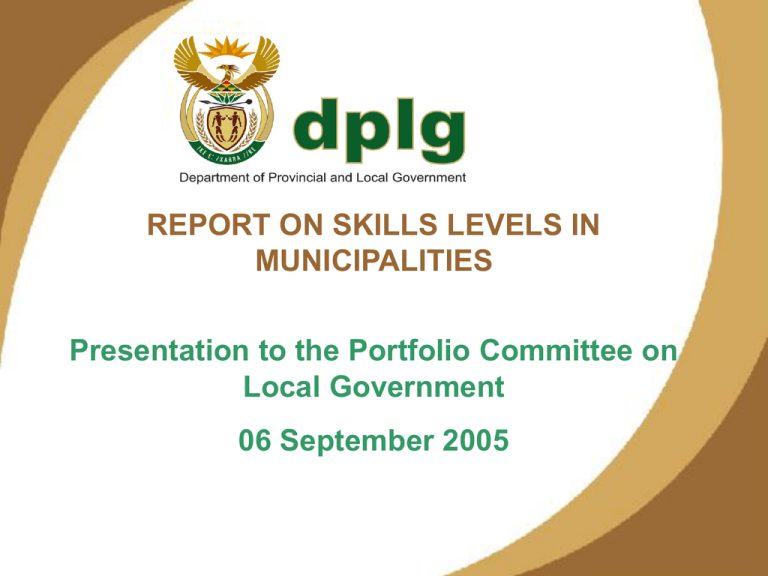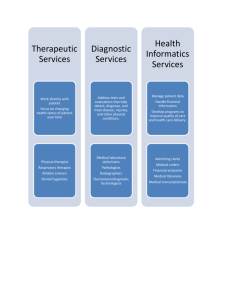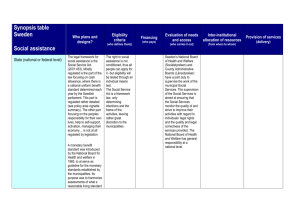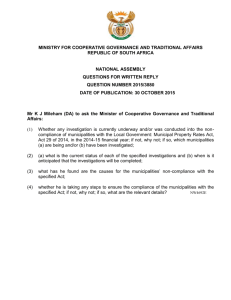recent and emerging observations
advertisement

REPORT ON SKILLS LEVELS IN MUNICIPALITIES Presentation to the Portfolio Committee on Local Government 06 September 2005 OVERVIEW OF PRESENTATION This presentation covers the following aspects: Background Key observations Recent and emerging observations Technical challenges Recommendations 2 BACKGROUND Report part of the FOSAD task to review the capacity and organisation of the state Part of this task was the need to undertake a skills audit that will capture the current and existing skills in the local government sector. The purpose is to indicate the problems relating to acquiring and retaining competent skills and capacity for the realisation of the vision of developmental local government. 3 BACKGROUND The report captures key observations extracted variously from a number of data sources and surveys conducted by among others, the Municipal Demarcation Board (2004/5); Local Government SETA Workplace Skills Plans (2003/4); South African Institute of Civil Engineers (2005); and the Development Bank of South Africa (2004). Efforts are underway to consolidate all the available local government human resource information in the possession of various stakeholders into a concise, focused Skills Audit Baseline-information Report. KEY OBSERVATIONS The local government and water sectors are facing a large increase in the demand for skills as a result of the following factors: a) The transformation and restructuring agenda of the sector c) Employment equity considerations b) The transformation of human resource management practices, and The overall number of employees within the sector has remained relatively stable over the last number of years since demarcation in 2000 at approximately 230 000. However, more significant than retrenchments has been the considerable outflow of skills from the sector because of resignations, particularly from managerial and skilled technical occupations. q There is a high proportion of those leaving the sector doing so because of death. It could be assumed that these deaths are HIV/Aids linked, escalating the need for training because of staff KEY OBSERVATIONS Almost 44% of employment in the sector is still in the lower end plant and machine operators and elementary occupations. Though only one-fifth of employment resides in the technician and associated professional, senior management and leadership categories, this is where the bulk of skill needs and shortages are. q Significant numbers of people in the category NQF 4,5 and 6 appear to be leaving the sector, and the replacement demand for skills is not being fully met, either through recruitment or through skills development initiatives. q The greatest problems with acquiring and retaining skills has been in the professionals, senior management, and technicians & associated professionals, occupational categories. This outcome is expected given widespread evidence of skill shortages in these high-end occupations across the economy. KEY OBSERVATIONS The following is a summary of key scarce skills within the sector: Strategic management skills, including policy skills and those needed to lead, develop, monitor and evaluate IDP’s (Integrated Development Plans) Financial management skills Contract management skills with particular emphasis on building good procurement practices, and An overriding concern with the development of political and administrative leadership in the sector. Project management skills ABET (Adult Basic Education) Technical skills of all types 7 KEY OBSERVATIONS Recruitment into the sector is reasonably limited, and is focussed on skills replacement. The bulk of the recruitment in the local government sector is in the following categories: elementary occupations (30%); clerks and service workers (21%); senior officials and managers (11%) The numbers of new labour market entrants in each municipality and province are too small to determine any significant sectoral trends. The system of internship within local government and water is not at all developed. Staffing Levels MDB observes that, while the staffing levels have almost doubled since 2002, the Free State Province's average district municipality staffing levels are significantly lower than those found in other provinces. KEY OBSERVATIONS The staffing levels in the district municipalities in the Eastern Cape show a steady decline. Mpumalanga and North West demonstrate slightly lower levels in 2004 when compared with 2002 average staffing result. However, provinces in which a decrease in staffing levels would be expected, given the water and sanitation authorization for local municipalities, such as in the Western Cape and Northern Cape, this was not found. Rather, the Western Cape Province demonstrates one of the highest staffing level increases from 2002 to 2004. With regard to the local municipality staffing levels in 2002 and 2004, the Municipal Demarcation Board states that the following provinces demonstrate an average decline: 1. Eastern Cape; 2. Free State; 3. Gauteng, and 4. KwaZulu Natal. 9 KEY OBSERVATIONS The remaining provinces all show increasing staffing levels over the years, however, they tend to be slight. In all instances, the average staffing levels for local municipalities are greater than that at district level. This is to be expected given the different roles and responsibilities played by district and local municipalities in the delivery of services. Gauteng and the Western Cape on average, remain the two provinces with the most human resource capacity at local municipality level. The provinces with poor ratio per employee to household tend to be those that contain municipalities covering the former Bantustan areas. The municipalities in the large urban centres have significantly larger staff complements than those found in the Integrated Sustainable Rural Development Strategy (ISRDS) areas. 10 KEY OBSERVATIONS Technical staff The South African Institute of Civil Engineers (SAICE) Report (2005) observes that, Traditionally local government has been a major employer of civil engineering professionals, with engineers commanding the key roles of City Engineer and senior engineers/designers, whilst civil technicians have generally been used to manage maintenance and operations. An appreciation and understanding of the importance of professionals in local government has been lost, as a result of the restructuring in local government and the appointment of an additional, non-technical senior level of management. The Institute alleges that significant numbers of professional staff have been offered early retirement, or have been replaced by non-technical decision makers. KEY OBSERVATIONS The introduction of equity targets has resulted in the sector losing staff, and not being able to fill the vacant posts. The reason for this is that insufficient black professionals have reached the level of experience required, since black graduates only started entering the profession in larger numbers in the late 1990’s. Stringent criteria with regard to professional competency for engineers required in the past have been relaxed and in many instances done away with altogether. Inexperienced, young technicians, graduates in other built environment or engineering fields, or even non-technical staff is employed in senior positions in order to satisfy equity ratios. KEY OBSERVATIONS In a research carried out by SAICE (2005) included a complete census of all civil professionals in the 284 local, and district municipalities and metros. The civil engineering statistics are as follows: No civil professionals 74 of the 231 local councils have no civil engineers, technologists or technicians 4 of the 47 district councils have no civil engineers, technologists or technicians Only one civil technician KEY OBSERVATIONS Only young staff 43 local councils employ only technologists and technicians under the age of 34 6 district councils employ only technologists and technicians under the age of 34 Only 70 with civil engineers Only 45 local councils had any civil engineers on their staff Only 25 district councils employ any civil engineers on their staff 14 KEY OBSERVATIONS Those local and district municipalities which did have staff reported that on average 35% of the existing posts were vacant, in addition to newly created posts not having been filled. RECENT AND EMERGING OBSERVATIONS The Local Government SETA is currently engaged in a Sectoral Skills Plan review process to be incorporated into the final submission to Minister of Labour on 30 September 2005. Very few questionnaires (on scarce skills)responses (approximately 25) have been received so far from W. Cape, N. Cape, and E. Cape. Although this is not enough information to make claims for the KEY OBSERVATIONS Here are the emerging observations with regard to skills gaps: Senior IT specialists Senior medical & allied staff (Medical Officer of Health - clinic administrators/ managers, MOH Environmental health specialists & occupational health & safety specialists Librarians (surprisingly, and across all responses) LED (Local Economic Development) officers/ specialists (again across all responses) Certain indications of shortage of finance managers/ senior finance people 16 KEY OBSERVATIONS Engineers Electricians (across all submissions) Meter readers Firefighters and emergency services workers There are indications that where specialist posts are filled - like engineering, LED and Urban Planning, inadequately qualified people are placed in these jobs. Another interesting observation is that the majority of the vacancies relative to posts available are in clerical and basic occupational categories (unskilled workers). There are major vacancies in the support areas in municipal finance such as, cashiers, clerks, housing and housing administration, credit control clerks, general administration clerks. Labourers in all areas including water and waste, drain laying and refuse removal also appear to be lacking. KEY OBSERVATIONS Very few vacancies are being declared at senior management and management level. However, people occupying these positions appear not to be adequately qualified for the jobs (in terms of the relevant National Qualifications Framework levels). It appears that there is salary/ rank inflation, thus resulting in sacrificing salary allocations at lower level for higher-level staff. 18 TRAINING CHALLENGES Financial skills Financial management training ranks foremost among capacitation requirements of almost every local authority. the All councillors are of the view that there could be no effective institutional performance without firm “financial foundations”. Secondary level of financial personnel involved in the day-to-day running of councils – including both internal financial administration and persons involved in the billing for services – needs urgently to receive considerable additional training and ongoing support if councils are to arrest the payment and fiscal crises they confront currently. All councils, including (in many cases, especially) the Metropolitan councils, face tremendous difficulties in terms of simply calculating and billing consumers correctly. TRAINING CHALLENGES Technical skills A lack of technical capacitation could become a key challenge for the majority of municipalities in South Africa. This is most evident in low capacitated municipalities, where technical staff without adequate experience and qualifications has been recruited at all levels. Technical training, especially in low capacity rural councils, runs a close second in terms of immediate market demand. The demand analysis noted that there is a considerable shortage of technical skills across the full spectrum of local authorities. These requirements need to be addressed if local authorities are to succeed in their primary function of delivering effective services and maintaining and developing local infrastructure. 20 TRAINING CHALLENGES Recent changes in municipal legislation, as well as the requirement that “basic services” be provided at no cost to all residents, add to the need for capacitation in the technical sphere. In addition to service-specific skills (engineers, pump repairmen, etc.) the study noted a general shortage of appropriate Information Technology skills. This affects the running of technical departments, billing systems, accounting systems, and the general administration of local authorities. Whilst some strides have been made in improving the IT capacity of local government, this needs to be enhanced considerably. 21 TRAINING CHALLENGES Institutional capacity Institutional development and human resource capacity development are amongst the most urgent tasks confronting local government today. Councils across the spectrum face a growing crisis of institutional sustainability. In terms of institutional training, it is important to address critical shortcomings in institutional and associated human resource capacity in municipalities across the board. Institutional development includes the development of proper management procedures and the training of supervisors. It also includes the need to promote general “institutional awareness”, for example, by providing training relating to the changing legal context within which local government exists, and relating to the myriad of new legislation that often overwhelms local government practitioners. RECOMMENDATIONS Developmental local government requires both common and unique capabilities to equip its cadre of leadership. A core of municipal leadership (elected and appointed) possessing the leadership capabilities, service ethos and orientation towards development that developmental local government demands is a precondition for sustainable and performance-driven municipal government in South Africa. There is a need for strategic human performance interventions that can impact on the individual performance of managers and staff of municipalities. These interventions should seek to shape and affect the perspective, orientation and contribution of local officials to government’s program of transformation change and development path. 23 RECOMMENDATIONS Such human performance interventions should include: Identifying the minimum capacity required to deliver the government’s programs – insistence on professional criteria and specified minimum qualifications and experience (especially with regard to technical staff). Avoiding employing inexperienced and non-technical individuals in senior positions Attracting, remunerating and retaining scare skills. Provision of appropriate motivation and resources to enable workplace training and range of experience required. A clear need to work collaboratively with various professional bodies/associations to inform, assist mentoring and coaching of professionals. Introduction of special advisors on professional and technical services (finance, engineering and economic services) located appropriately at RECOMMENDATIONS Professional bodies and associations can also assist in this regard – explore the use of retired professionals. Municipal managers becoming champions of change. They must possess a combination of managerial competence, organizational savvy and political sensitivity to perform their role effectively as champions of fundamental change Locating that capacity where it matters – scarce skills and resources (professional/technical) to be located in key areas (e.g. district level) to service all municipalities in their jurisdiction. Thus making better use of resources that have been consolidated into larger structures Streamlining of non-technical senior management – to avoid delay in decision making and lack of appreciation and understanding of the upstream or downstream effect of new developments Assessing current skills development programmes to ascertain the extent to which they are aligned with the unique challenges posed by the developmental thrust of the South African local government system. RECOMMENDATIONS Building of a single public service dedicated to integrated service delivery and adoption of an ethical, problem-solving and constructive approach to working life THANK YOU 26






